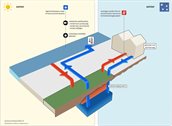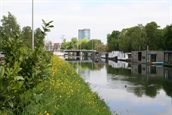Cooling and Utilising Heat Impact Project
In the Utrecht region, the district water board and municipalities have jointly commissioned a regional map of opportunities for generating thermal energy from surface water (Dutch acronym: TEO). The cooling and utilising heat project is intended to map out the options offered by this source of energy for two locations by elaborating concrete business cases. The elaborations of the Merwede Canal zone in Utrecht and the De Mossen district in Houten demonstrate that it is feasible, that it is allowed, and that it is financially attractive.
Surface water as a source of energy
Surface water is a sustainable source of heat and cold, and of major potential significance in the energy transition. The recovery of heat cools the surface water. Utilising this source of energy thus helps to combat of heat stress and improve water quality, e.g., by combating blue-green algae. The infographic below shows how the TEO principle works.

It is feasible, it is allowed, and it is financially attractive
The Impact Project has elaborated two concrete business cases: the Merwede Canal zone in Utrecht and the De Mossen district in Houten. The Merwede Canal zone in Utrecht is a new-construction project characterised by highly compact high-rise buildings along a wide canal. In Houten, a business case has been elaborated for an existing new estate (De Mossen) at the Oosterlaakplas recreation lake. The two business cases show that it is feasible, that it is allowed, and that it produces a financially positive result. In addition, it will cool the Merwede Canal by approx. 2 degrees over a stretch of some 1000 metres and reduce the heat emission of coolers. A more efficient utilisation of the heat in the Oosterlaakplas lake will also lead to additional cooling, resulting in, inter alia, a reduced risk of blue-green algae. Plans for a sustainable heat supply in the two areas will be further elaborated, based on the outcomes of the Impact Project.

Lessons learned
The following lessons have been learned from the Impact Project:
- Thermal energy from surface water can significantly reduce heat stress, if implemented on a wide scale.
- For projects involving compact constructions in the vicinity of surface water, thermal energy from surface water constitutes an interesting alternative to natural gas.
- The decisions made by developers are based on different considerations than those made by municipalities and district water boards. This means that a socially and financially advantageous business case holds no guarantee that developers are prepared to invest in thermal energy from surface water.
Contact persons
Marco van Schaik
Unie van Waterschappen
mschaik@uvw.nl
030 – 6345774
Barry Scholten
Smart polder IF Technology
b.scholten@iftechnology.nl
06-50451394